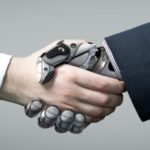The impact of robots on employment
2016 will be the year for smart machines to definitively takeoff. Experts stress that employment grows significantly faster in occupations that use computers more.

Robots and other technologies transform supply chains, track items from source to the consumer, minimizing the time and cost of shipping, automate administrative tasks and offer endless opportunities in different sectors. In 2016 and 2017 China will lead global robot production, churning out close to 400,000 units, while the United States will produce 300,000, according to the International Federation of Robotics (IFR). And one of the questions raised is whether this growth can remove the need for human workers and cause persistent technological unemployment.
The article in the New York Times Automation Is a Job Engine, New Research Says stresses that new "smart machines" are radically changing the nature of work; the question is how they are doing it, i.e. Does technology kill jobs or simply create a demand for new skills?
A recent article by James Bessen, a law professor at Boston University, analyzes the impact of technology on employment and provides food for thought. Using government data, Bessen examined the impact of computer automation on 317 professions (occupations) from 1980 through 2013. His conclusion could be summarized in one sentence: Employment grows significantly faster in occupations that use computers more.
The advance of technology creates more jobs
Historically, it is well established that the advance of technology has generated more jobs than it has replaced, which would be the trend that could be envisaged. More than 80 years ago, the renowned English economist John Maynard Keynes warned of the new disease of "technological unemployment". Yet the paper by Bessen provides a detailed study of technology and jobs in recent years. According to Bessen, "The idea that automation kills jobs isn't true historically, and if you look at the last 30 years, it's not true then either". In fact he added, "Right now, the best thing that can happen to you is to get some automation to do your job better."
Historically, it is well established that the advance of technology has generated more jobs than it has replaced, which would be the trend that could be envisaged
His conclusions are based on occupation, salary and computer-use data from decennial, yearly and monthly surveys, mainly from the United States Census Bureau and the Bureau of Labor Statistics. In his paper, he also describes the effect of new technology on a handful of occupations.
As an example Bessen says the economic response resulting from the introduction of ATMs was much more dynamic than expected. And this is not new. During the Industrial Revolution, automation did not cause technological unemployment. In the nineteenth century, for example, the power loom automated 98% of the work needed to produce almost a meter of cloth, but the number of jobs in material factories increased. Why? The lower cost of labor per meter represented a lower price in competitive markets, which boosted demand for cloth and the demand for weavers increased, even though the labor required per meter decreased.
Moreover, as technology automated more textile tasks, other weaver skills, such as coordinating works in several looms, gained greater value. Weaver wages increased significantly compared to those of other workers in the late nineteenth century. The economy also responds dynamically in other ways. Sometimes, new jobs are generated in related professions. For example, electronic publishing involved fewer printers, but more graphic designers.
The other aspect that is worth analyzing is what kind of jobs are more easily automated. We’re used to thinking that the jobs that are most likely to be taken over by automation are low-skilled ones, such as assembly line workers. In contrast, highly-skilled jobs, such as doctors for example, seem like they will be comfortably insulated from the robot revolution.
But new research from the consultancy firm McKinsey & Company highlighted by The Washington Post shows that isn't quite right. While there is a connection between a job's skill level and the likelihood it will be automated, there are a lot of jobs that don't fit that pattern. One example: CEOs, whose jobs will be more affected by automation than landscapers, the researchers say.
Actually, there are few occupations that could be entirely turned over to robots, it is estimated that only 5% with the technology available today. The more accurate way to think about this, they say, is not in terms of entire jobs, but in terms of activities. Few of us will actually be replaced by a robot. But there are tons of workers who will have part of their jobs taken away by automation. For about 60 percent of jobs in the U.S., nearly a third or more of their activities could be automated.
Therefore, computer automation does not necessarily imply an imminent and massive reduction in jobs; new technologies can also increase the demand for workers with new skills. In fact, the process of automating some tasks or activities in certain occupations seems that it can increase productivity, resulting in more and better products for consumers.
As the experts conclude: the technology revolution is likely to accelerate. Artificial intelligence will gain greater capabilities in the coming years and will possibly absorb tasks in hundreds of occupations. But this is no reason to despair about the "end of work", but another reason to focus on policies that help many workers to be able to acquire the knowledge and skills needed to work with new technology.